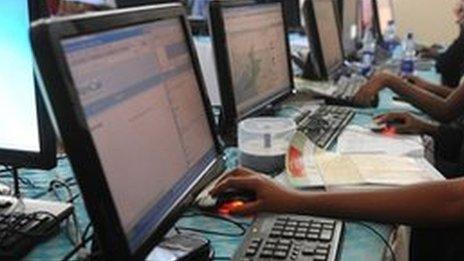Letter from Africa: Kenya passes electoral test - but what next?
- Published
- comments
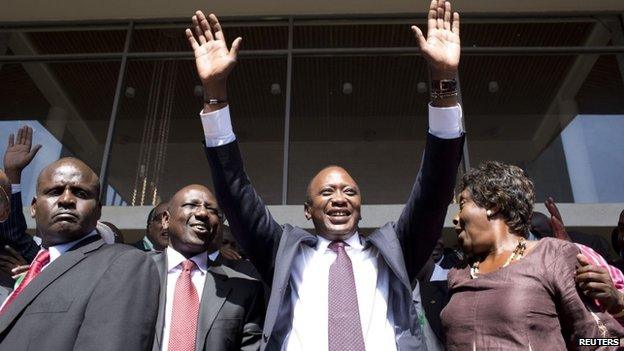
Uhuru Kenyatta (2R) and his deputy William Ruto (2L) have been charged with crimes against humanity
US intervention in Kenya's presidential election strengthened the resolve of voters to propel Uhuru Kenyatta into the presidency, writes Nairobi-based Joseph Warungu in our series of letters from African journalists.
"Choices have consequences" - that warning to Kenyans, issued by US Assistant Secretary of State Jonnie Carson almost a month before the presidential election won by Uhuru Kenyatta, played on the minds of many voters as they cast their ballots on 4 March.
When in early February, during a briefing to journalists, Mr Carson was pushed to explain America's position regarding the candidacy of two politicians who are charged with crimes against humanity at the International Criminal Court, he had a simple answer:
"We live in an interconnected world," Mr Carson said, "and people should be thoughtful about the impact that their choices have on their nation, on the region, on the economy, on the society and on the world in which they live. Choices have consequences."
Alone in the polling booth, more than six million Kenyans said to themselves: "I'm an African and a Kenyan, I don't need anyone out there telling me who or what to vote for."
As a consequence - they now have President-elect Kenyatta and his deputy, William Ruto, who will divide their time between running Kenya and fighting their cases at The Hague.
Some are calling it government by Skype.
'Family affair'
Kenyans also have a new form of decentralised government, the product of a progressive constitution they approved in 2010, that seeks to redistribute power and wealth from Nairobi and the presidency, to 47 counties, each led by a governor and local assembly.
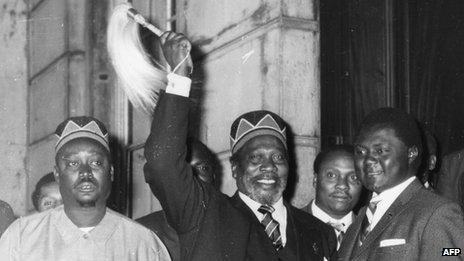
Jomo Kenyatta (c) and Oginga Odinga (l) were bitter rivals, just like their sons
That same constitution also introduces 47 new seats for women in parliament in an attempt create better gender equality.
A bigger voice for women will certainly change the tone of debate in parliament, which in the past tended to echo the contents of the MPs honourable wallets, as they awarded themselves hefty pay increases.
Despite these major changes in governance, any Kenyan who went to sleep soon after independence 50 years ago, and woke up last weekend will be forgiven for quickly telling themselves: "I haven't missed much - Kenyatta is still fighting Odinga!"
Just like the early 1960s when President Jomo Kenyatta's main rival was Oginga Odinga; his son Uhuru Kenyatta's main challenger for power was Mr Oginga's son, Raila Odinga.
Indeed, the more things change in Kenya, the more they remain the same.
Former President Daniel arap Moi's shadow is also back in parliament and the new upper chamber, the Senate, in the form of his two sons, Alexander and Raymond Moi.
Like father like son, like brother like brother, like brother like sister.
The new Kenyan leadership is certainly a family affair, with another four sets of siblings elected into office.
But this was also an election with a difference.
A presidential debate was held for the first time ever - not once but three times.
With more than 80% of registered voters heading to the polling stations, it was the highest turnout in Kenya's history.
And although the final results took six days to be released, not a machete was lifted in anger - this was Kenyans at their most patient.
By turning up in such large numbers, Kenyans were re-establishing their faith in the democratic process.
And with Mr Odinga pledging to accept the ruling of the Supreme Court which will hear his case alleging that Mr Kenyatta's victory was rigged, he and the rest of Kenya was expressing confidence in the judiciary.
This too was an election about dreams and possibilities.
'Digital leaders'
That an unknown high school teacher from a minority community could run for presidency and beat seasoned politicians was unheard of.
Never mind that Mohamed Abduba Dida, was the source of comic relief in the presidential election campaign with such profound utterances like "you should only eat when you're hungry".
It was also an election fought and followed on social media.
Twitter was ablaze with running commentary on the campaign, the polling, the results and the waiting.
It featured the serious and light-hearted.
One presidential candidate who won the lowest number of votes was advised by tweeters not to bother taking up public space to concede defeat, but just spend a few minutes ringing each of the handful of people who voted for him and thank them personally.
The Kenyan media itself was a big winner in the election.
Compared to 2007 when the media was accused of fanning the post-election violence, this time round every single media house went all out with robust and consistent messages of peace.
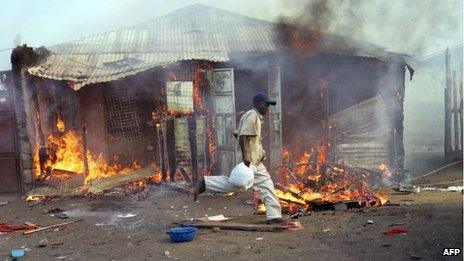
There has been none of the violence seen after the 2007 election
So what awaits the new president when he finally takes the keys to State House once the Supreme Court has made its ruling on the pending petition?
A divided nation - the election results confirmed what every Kenyan has always known, that the country is still deeply split along ethnic lines.
Most people voted not for "policies that speak to me" but for "personalities that speak like me". Deep and genuine social healing and building of bridges will be a top priority.
Insecurity - with Kenyan forces still in Somalia, trying to stabilise their troublesome neighbour; with unemployment rising above 40% and with the cost of living heading to the skies, insecurity is alive and dangerous.
President-elect Uhuru Kenyatta acknowledged the urgency of the matter in his victory speech when he paid tribute to several police officers killed on the eve of the election.
Without security, meaningful development will be difficult. The president's tenure is unlikely to be secure if Kenyans remain insecure.
Landlessness - for a man whose family owns huge tracts of land in different parts of Kenya, Mr Kenyatta will be under a lot of scrutiny to see how he tackles the touchy issue of land ownership.
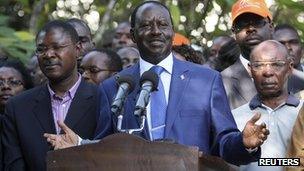
Mr Odinga lost presidential elections for the third time
Kenyans will watch keenly how his government will address historical injustices regarding land that have left thousands displaced and forced Kenyans to jump on each other's throats disrupting lives and livelihoods.
Throughout the campaign, the Jubilee coalition led by Mr Kenyatta and Mr Ruto sold itself as a digital or modern, youthful party, compared to their rivals who were said to be stuck in the old analogue era.
By choosing to position themselves as "digital" leaders, the two will have now have to live with the consequences of the meaning of "digital".
As a broadcaster, I understand digital to mean bigger capacity, greater variety and flexibility; and also better quality - in this case of leadership and service delivery.
Kenyans are looking up to the new leadership with great hopes for better healthcare, jobs, improved agriculture and a faster pace of economic development.
The people are waiting to see what choice will preoccupy the president and his deputy - Kenya's development or the ICC process.
With the ICC prosecutors now saying they have new evidence against Mr Kenyatta and that his prosecution should continue, choices, indeed, might have consequences.
If you would like to comment on Joseph Warungu's column, please do so below.
- Published27 November 2017
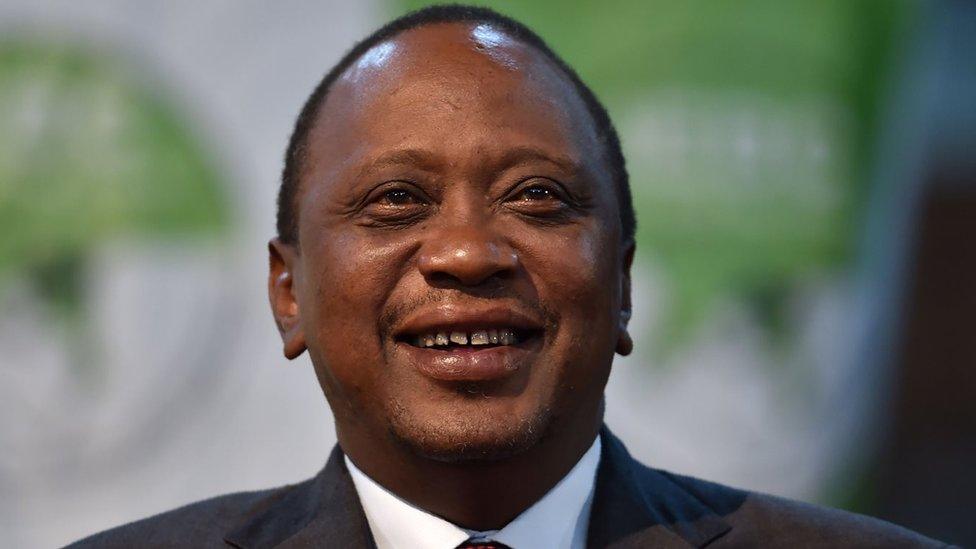
- Published11 March 2013
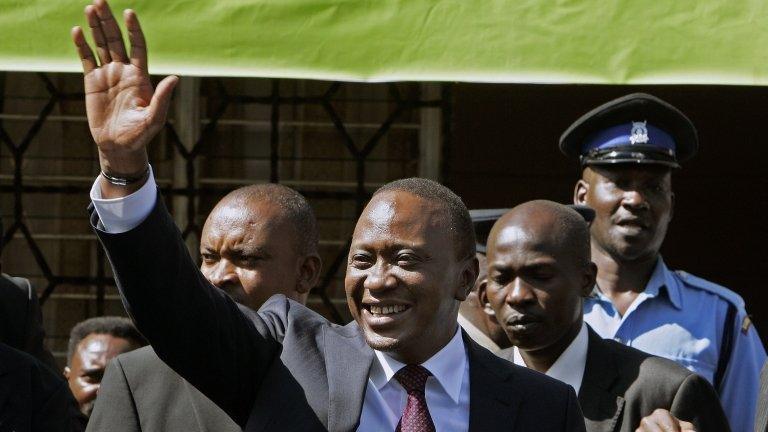
- Published3 March 2013
